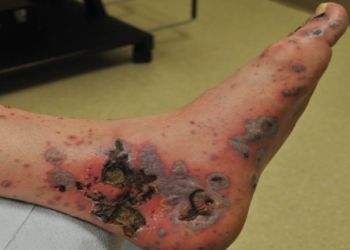Services
Medium Vessel Vasculitis




What is medium vessel vasculitis?
Vasculitis is a term for a group of diseases that have in common inflammation of blood vessels. These vessels include arteries and veins. Medium sized vessels usually supply structures like nerves, skin ,kidney, eyes and intestine.
What is the cause?
It is attributed to be an autoimmune process with some genetic predilection. Also few infections like Hepatitis-B & C play a major role in causation.
What are the symptoms?
-
- Unexplained fever
- Weight loss
- Abdominal pain
- Muscle aches
- Palpable skin lesions
- Non healing ulcers
- Weakness of hands or feet
- Testicular pain
- Redness of the eyes
How can it be diagnosed?
No single test is confirmatory. But biopsy of nerve, muscle, tasticle or skin biopsy may be needed to diagnose.When there is a strong clinical suspicion, apart from the routine investigations, visualization of blood vessel by angiography or biopsy of the affected organ may have contributory findings
What are the medications used in treatment?
It requires initiation of high dose steroids(either prednisolone or its equivalent dose) along with other immunosuppressants like
cyclophosphamide, mycophenolate, azathioprine, depending on the clinical indication. Biological agents like Rituximab may be helpful. For hepatitis B & C positive cases, special precaution is needed.
How is the course of disease?
If diagnosed early and treated aggressively, disease can be well controlled. There may be relapses in few patients which can still be managed well with the present day medication.
What monitoring needs to be done?
-
- Blood pressure
- Renal function tests
- Blood counts
- Liver function tests
- Blood sugars and lipids for those who are on steroids
Are there any alarming symptoms?
Yes, there are few symptoms at the onset of which you need to see a physician immediately
-
- Uncontrolled Blood pressure
- Severe headache
- Severe weight loss
- Persistent fever
- Abdominal pain
- Reduced quantity of urine
- Redness of eyes
- Sudden blurring of vision
- Blackish discoloration of fingers or toes
- New onset skin lesions
How often to follow up?
You need to be seen by the treating rheumatologist monthly for initial 3 months, followed once in 3 months after stabilization and later on 6 monthly follow up is compulsory. It is important to be compliant with the medications.
Are there any complications which can be dangerous?
Yes, there can be life threatening complications affecting major organs like kidney and heart, if the medications are not taken regularly.
How about the prognosis?
With continued monitoring and minimal maintenance medications, the disease has a good outcome and life expectancy, without much of disease worsening.
